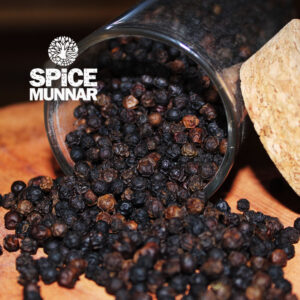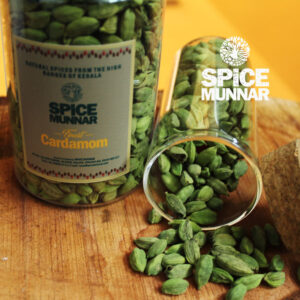Spices play a significant role in the way we cook and consume food around the world. Every spice has its own flavouring and essence, and its addition or omission can literally make or break a dish. There are many spices we use in our day to day cooking, these include popular ones like cumin, black pepper, turmeric and coriander seeds. In ancient times, India attracted traders from remote parts of the world in search of exotic spices.
Many of these traders went back with their share, while some even settled down and brought in some of their home-grown spices. Such is the role of spices in Indian culture. Spices are known to have several health benefits; in fact, it’s the addition of a bouquet of spices, that makes traditional Indian home-cooked food one of the healthiest meals eaten around the world. Spices come with notable nutritional values and provide some major health benefits.
1. Anise: Star anise is usually used for culinary purposes in Chinese, Indian, Malaysian and Indonesian cuisines. Star anise is a rich source of two important antioxidants namely linalool, an essential oil, and vitamin C which protects the body against cellular damage caused by environmental toxins.

2. Allspice: It is a kind of berry that combines the flavours of pepper, nutmeg, and cinnamon for a power-packed flavour dose. It helps in digestion, has anti-inflammatory properties, improves circulation, promotes dental health, enhances immunity and promotes heart health.
3. Ajwain: Ajwain is also known as carom seeds. Carom seeds are often chewed for medicinal purposes. Despite a partially bitter taste, Ajwain or carom seeds provide a whole host of health benefits. Ajwain promotes digestion, cures stomach aches and helps relieve tooth pain. These seeds are rich in calcium, proteins and fibre too.
4. Black Pepper: A pinch of black pepper when added to any recipe enhances the flavour manifold. Black pepper, also known as the king of spices, promotes weight loss, helps relieve cold and cough, improves digestion, boosts metabolism and treats many skin problems. In fact, a glass of turmeric becomes much more therapeutic with a pinch of black pepper.

5. Cumin: This seed has a bitter taste which is an essential part of Middle Eastern cuisines. It has the ability to aid digestion, improve immunity and treat skin disorders, insomnia, respiratory disorders, asthma, bronchitis and anaemia. For centuries, light gravy flavoured with cumin or a glass of jeera water has been used in Indian households as a fool-proof remedy for digestive issues.
6. Clove: Cloves are antibacterial, anti-fungal and antiseptic. They’re a powerhouse of antioxidants and are rich sources of minerals, omega-3 fatty acids, fibre and vitamins and minerals. Clove oil is one of the richest sources of antioxidants. In aromatherapy, it is used as an antiseptic and pain reliever, especially for toothaches and stomach pain. It is often mixed with other oils to treat various disorders. For instance, those who have troubled sleep can apply some warm clove oil along with sesame oil on the forehead to feel calm and relaxed.
7. Coriander: It is also known by the name cilantro or dhaniya. Coriander comes packed with essential health benefits. It is not only beneficial when consumed fresh, adding coriander seeds to your daily food can also be very healthy. Coriander seeds have anti-oxidant properties and dietary fibre that advance the healthy working of the liver and facilitate bowel moments. They help in the generation of digestive compounds and juices that facilitate the procedure of digestion. In the event that you experience some indigestion, try and add coriander seeds in your diet. You will definitely notice a difference.
8. Chillies: Chillies are healthy for you and provide you with various health benefits, apart from a spicy kick to your food. When added to your diet, these can be a good source of vitamin C, aids weight loss, lowers blood pressure and relieves
9. Cinnamon: Cinnamon is a favourite household spice which has been used throughout the world for ages. It has a large number of antioxidants which protects the body from body diseases and has many anti-inflammatories. Cinnamon forms a part of many exotic dishes and is currently trending because of its ability to reduce tummy bloat.
10. Cardamom: Also known as elaichi, cardamom hails from India, Bhutan, Nepal, and Indonesia. It is the world’s third most expensive spice. A rich source of vitamin A and vitamin C, calcium, iron, and zinc, this spice promotes heart health, helps in digestion, enhances oral health, helps in diabetes, helps fight depression, fights asthma, prevents blood clots and treats skin infections.

11. Fennel: It is native to Southern Europe and grown all over Europe, the Middle East, China, India, and Turkey. This spice is a rich source of dietary fibre. Its powerful antioxidants help in removing harmful free radicals from the body and promote a healthy being, it helps fight ageing and other degenerative neurological diseases.
12. Fenugreek: Cultivated in North Africa, the Middle East, Egypt and India, this ingredient has many medicinal uses. It improves digestion, is known to increase libido in men, promotes milk flow in mothers, helps those suffering from eating disorders and also reduces inflammation.
13. Nutmeg: It is a popular spice used in cooking across the world and it is also famous for its health benefits. In ancient times, nutmegs were used for numerous remedies to improve health. It improves bad breath, helps detox the livers, helps you to sleep well and is known to improve the texture of your skin.
14. Saffron: It comes from a flower and has a bright yellow colour and a very distinctive aroma. It is often used in cooking to give its colour and essence to the food. It helps manage asthma, aids in menstrual problems and soothes dry skin.
15. Turmeric: This spice is packed with antioxidants, anti-viral, anti-bacterial, anti-fungal, anti-carcinogenic, anti-mutagenic and anti-inflammatory properties. It is good for your brain, relieves arthritis, prevents cancer and has healing properties. Turmeric’s anti-inflammatory properties have been instrumental in treating osteoarthritis and rheumatoid arthritis. The antioxidant also destroys the free radicals in the body that damage the cells.


